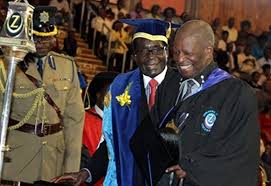Seated in a shed behind his compound, Mr Ignatius Chiketa Kanengoni, Chief Mashayamombe of Mhondoro, scribbles on a piece of paper.
Though his shaky, feeble hand and squinting eyes are tell-tale signs of weariness, he continues undeterred. The traditional leader is not preparing customary court summons or a public meeting announcement. He is jotting notes for his academic thesis.
At 82-years-old, Chief Mashayamombe is reading for a Doctor of Philosophy degree with the Zimbabwe Open University. A teacher whose love for the profession was set aside to assume the chieftainship, Chief Mashayamombe first came to national notice when President Mugabe accorded him the special honour of a standing ovation when he graduated with a Master’s degree in Peace, Leadership and Conflict Resolution in 2013.
Now two years away from a doctorate, he continues to forge ahead as he balances superintending his jurisdiction and advancing his studies. When The Sunday Mail arrives at his home in Mhondoro, the chief is a student, hunched over a paper he is intensely poring over.
One of his aides politely intrudes to announce our arrival and he suspends his writing, his thought pattern shifting from lofty academic realms to welcoming us warmly. Chief Mashayamombe gets up, straightens his navy blue jacket and matching trousers, and slowly drags his seemingly swollen feet towards his visitors.
“I am sorry,” he begins, “I was concentrating on my work and did not hear you arriving. This weather is just too perfect for someone not to read.”
He offers us chairs carved from exotic wood, giving us a glimpse into his tastes. As he is about to sit, he remembers “an important article requisite for the interview”.
Chief Mashayamombe swiftly heads into his house, returning barely a minute later with his Master’s degree graduation gown in one hand and his chief’s apparel in the other.
“I would want to demystify the notion that as one gets older, memory, sight and reasoning deteriorate,” he says while donning his graduation gown.
“According to my own research findings, as humans, we do not go through the same stages of aging. I do not use spectacles for reading; my reasoning, memory and hearing are very fine.”
A qualified teacher, Chief Mashayamombe attained a Bachelor of Arts degree in Sociology from the University of South Africa in 1995.
The degree and other qualifications earned over the years, girded his teaching career spanning 26 years. Destiny would, however, turn him away from his first love, teaching, when the noble call to lead the people of Mhondoro landed on his table in 2007.
His love for teaching never died, and this saw him approach ZOU in 2010 in search of a posting as a part-time lecturer.
He prevailed over other candidates effortlessly on account of his vast experience. There was a catch though: A Master’s degree was required. He wasted no time in enrolling for a programme at the university.
“I remember my first examination as a Master’s degree student. These examinations require you to be a fast writer, a technique I had long forgotten. I sat four courses, but only passed one. At one point, I contemplated dropping out of the programme, but soldiered on by brushing such thoughts aside. I pulled up my socks and never failed a course again. I came up with a study timetable under which I would utilise night-time for my studies and reserved day-time for chieftainship duties. This is the routine I follow up to now.”
Chief Mashayamombe says many African chiefs face a lot of challenges due to lack of formal education, and this is one of the reasons why he is studying towards a PhD. He believes his thesis, which explores the relationship between and application of customary and English common law in Zimbabwe, could add value to the judicial system here and elsewhere.
“I have had judgments that I passed nullified by the High Court because of customary law/common law clashes. Prior to my PhD studies, I researched and found out that 63 percent of chiefs were facing the same challenges I was facing with the courts of law. I am proposing two parallel systems for our judicial system: One for common law and the other for customary law.”
Chief Mashayamombe finances his studies through pension payouts, which, he says, are hardly sufficient. And despite his academic achievements, he has a few to celebrate with.
“I had five children with my late wife. Three of them are late and of the remaining ones, one is in South Africa whilst the other has mental problems due to years of substance and alcohol abuse. Books have become my friends as they give me the necessary distraction, and I am grateful for that.”
As the Mhondoro sun sets and The Sunday Mail prepares to head back to Harare, villagers gather to share traditional and other brews at a nearby beerhall.
Chief Mashayamombe, the academic, will have none of that. He waves us goodbye and heads back to his books.-zp






